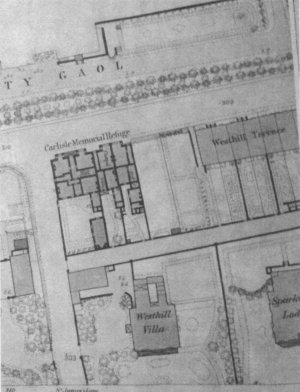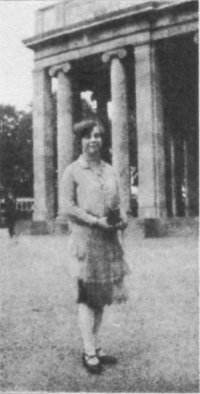Extraordinary Women in Winchester
- TrustNews Sep 19

1870s map of Romsey Road/St James
Lane junction showing Carlisle
Memorial Refuge
1918 saw the end of the Great War, and also the beginning, for those over the age of 30, of women's right to vote. The two were of course connected.
In 2018, to mark the centenary of Women's Suffrage, the theme of Heritage Open Days was Extraordinary Women. A highly successful exhibition in the Great Hall ranged from Juliana de la Floude, at the end of the 13th century, to Jean Johnson, who died in 2016. Juliana's legal fight for access to water led to the concept of clean drinking water as a right, not a luxury, being enshrined in the UN Convention of Human Rights; Jean worked through the Hampshire Federation of Women's Institutes with the English Collective of Prostitutes to decriminalise prostitution and improve the conditions and treatment of the women involved.
A public vote was held, complete with ballot papers and a Winchester City Council ballot box, to identify the most important of the 30 or so women. It was resoundingly won by Josephine Butler, 1828-1906, who arrived in Winchester from Liverpool in 1882 as clergy wife and social reformer par excellence. it's not known whether she inspired Jean Johnson, but she came to be known as the patron saint of prostitutes. After being shocked to find prostitutes as young as 12, her work resulted in the age of consent being raised to 16, and also brought about the Married Women's Property Act, changing the law under which all legal rights and property were ceded to the husband upon marriage. This had led to many women becoming prostitutes in the first place.

This year will see a second tranche of Extraordinary Women being acknowledged and applauded. This is a small taster for the exhibition, which will run from 13th - 22nd September in the Great Hall and then until the end of the year in the foyer of the Hampshire Record Office. The chronological scope is not quite so great but the women are every bit as remarkable.
Continuing the remarkable Winchester theme of women's social reform, Eliza Pumphrey was the first and only superintendent of the Carlisle Memorial Refuge, established in 1865 in four redbrick houses opposite the prison, on the corner of St James' Lane and Romsey Road. They are still there, one of them called Connaught House, in need of care and attention. The refuge was a home - Eliza insisted on that word - for women who had been released early from prison for good behaviour, prior to full release. They were able to have their children with them; Eliza also established a school for them nearby. She gave evidence to the Royal Commission of Enquiry into the Working of the Penal Servitude Act in 1878, by which time the refuge had been operating for 13 years. By then 1,016 women had passed through the establishment, only two of whom had ever absconded despite their being no locks on the doors. The establishment caught the attention of the great and the good; Ruskin was a visitor. Eliza was one of many number of Victorian women reformers, but one of whom little otherwise is known. There is no image of her to be found.

Mary Warnock
(photo by Murdo MacLeod)
Leaping into the 20th century, in 1920 Jeanie Dicks inherited and ran her parents' electrical firm, employing up to 90 men at a time when she was still deemed too young to vote. Winifred Holtby, best remembered as an early 20th century novelist but also a firm feminist, wrote of Jeanie Dicks in her book Women and a Changing Civilisation, "without thinking too much about it they have as successfully broken the line between 'women's interests' and 'men's interests' as the English woman electrical engineer, Miss Jeanie Dicks, who secured the contract for rewiring Winchester Cathedral." That was in 1934. The contract, worth 3,000 pounds, was won in competition with firms from across Britain and Europe, and the results were praised in the national press. Letters and journals in the Hampshire Record Office from some of her employees say she was a good and fair employer, and hint delicately that she had no difficulty deflecting any inappropriate comments from her staff. She sold the firm in 1960.
The most recent of the Extraordinary Women is Mary Warnock, Baroness Warnock of Weeke, who died at the age of 94 in March this year. She was a philosopher and writer, who received her peerage for her role chairing the government inquiry leading to the Human Fertilisation and Embryology Act of 1990. After school at St Swithun's she took a first in classics at Oxford, but was barred, as a woman, from Oxford's Saturday morning meetings of faculty philosophers. Despite this, she became head of Oxford High School and then Mistress of Girton College, Cambridge, writing some twenty books on ethics and education. Josephine Butler, who before arriving in Winchester had founded the North of England Council for Promoting the Higher Education of Women, and who campaigned for Cambridge University to allow women to take exams, would surely have had something to say about that. worth 3,000 pounds
